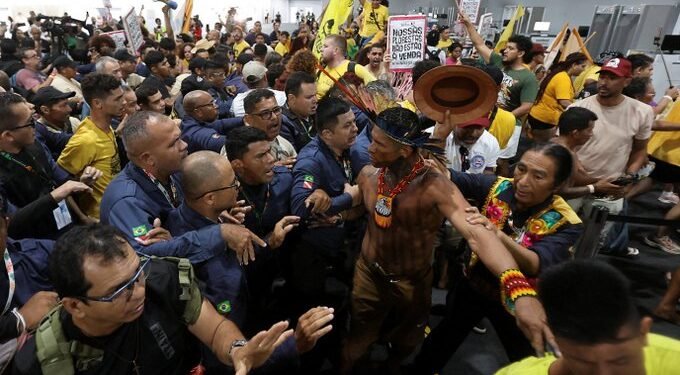BELEM, Brazil: The COP30 climate summit in Belem descended into chaos on Tuesday when dozens of Indigenous protesters broke through security barricades at the main entrance, demanding urgent climate action and the protection of ancestral lands. The unprecedented confrontation just days into the United Nations’ most high-stakes climate conference underscored the growing frustration among Indigenous groups who say they’ve been sidelined despite being the Amazon’s first defenders.
Witnesses described a tense standoff as protesters chanted and beat drums outside the United Nations compound hosting delegates from more than 140 countries. Many carried signs reading, “Our land is not for sale” and “Stop killing our forest.” Others waved traditional flags and banners demanding recognition of Indigenous territories and an end to industrial encroachment.
“We can’t eat money,” shouted Nato, an Indigenous leader from the Tupinamba community, his voice carrying across the humid air. “We want our lands free from agribusiness, oil exploration, illegal miners, and illegal loggers. What we protect feeds the planet, yet our people continue to bleed.”
Security forces stationed at the entrance initially attempted to contain the crowd peacefully but were quickly overwhelmed. In the ensuing scuffle, guards used tables and metal barricades to block the entrance.
Witnesses reported that one guard was carried away in a wheelchair, clutching his stomach, while another sustained a cut above his eye after being struck by a drumstick. UN officials later confirmed two minor injuries and “limited property damage.”
A UN spokesperson said in a statement, “Earlier this evening, a group of protesters breached security barriers at the main entrance to the COP, causing minor injuries to two security staff, and minor damage to the venue. Brazilian and UN authorities are investigating the incident. The venue is now fully secured, and negotiations continue.”
The protest was part of a larger demonstration involving hundreds of Indigenous activists and environmental allies who had marched through Belem earlier in the day. Many of them arrived in the city by boat, traveling from remote riverine villages in the Amazon basin to ensure their voices would be heard at what Brazilian President Luiz Inácio Lula da Silvahas called “the COP of Truth.”
President Lula, who has championed Indigenous inclusion in environmental policymaking, has made forest protection central to his leadership of this year’s climate summit. His government’s “Tropical Forests Forever Fund” unveiled during the Leaders’ Summit promises billions in new funding for conservation. Yet, Indigenous leaders argue that financial mechanisms mean little without direct recognition of land rights and real participation in decision-making spaces.
“We cannot just be symbols for speeches,” said Dinaman Tuxá, Executive Coordinator of the Articulation of Indigenous Peoples of Brazil (APIB). “Our communities live with the consequences of deforestation every day. If COP30 wants to be remembered for truth, it must start by listening to the people of the forest, not corporations.”
Environmental groups have also raised concerns about the limited access civil society has been given inside the Blue Zone, the secure area where most negotiations take place. Carolina Pasquali, Executive Director of Greenpeace Brazil, criticized the overwhelming presence of corporate lobbyists.
“Every year, we see the same imbalance Indigenous representatives and NGOs locked out, while fossil fuel lobbyists enter freely,” Pasquali said. “If the Blue Zone is to be meaningful, it cannot be dominated by the very industries driving the crisis.”
As night fell over Belem, UN and Brazilian security restored order, and delegates were escorted safely out of the venue. The main entrance was temporarily closed for repairs and is expected to reopen on Wednesday morning.
Despite the disruption, many see the protest as a reflection of the deeper tensions shaping this year’s summit between promises made in global climate forums and the lived realities of those on the frontlines of environmental collapse.
Veteran Indigenous leader Chief Raoni Metuktire, who also arrived in Belem for COP30, voiced support for the protesters, saying, “Our people have protected the forest for centuries. Now we ask the world will you finally protect us?”
As the COP30 negotiations continue, the clash outside the venue may prove symbolic of the broader struggle for climate justice, a reminder that the fight for the planet begins where the forest meets the front line.
-Leonardo Benassatto, Dr. Shahid Siddiqui and Lisandra Paraguassu



















